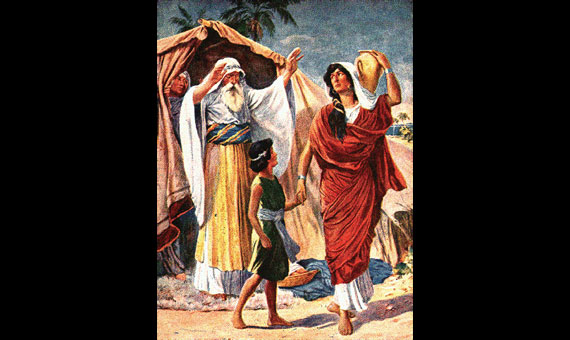Azadi ka Amrit Mahotsav Kolkata event honours four Clergymen
Pope Francis asks businesses to support working women: They’re ‘afraid to get pregnant’
Study: Christianity may lose majority, plurality status in U.S. by 2070
Indian politician declines Magsaysay Award under party pressure
Like John Paul II, Pope Francis heads to Kazakhstan during time of war

Jacob Chanikuzhy
We don’t celebrate weaning. But Abraham did throw a party when his son Isaac was weaned (Gen 21:8). In accordance with the Eastern standards Isaac must have been two or three years old when he stopped feeding on his mother’s milk. In the ancient times, when infant mortality was very high, an infant’s survival was something to be celebrated. So, when Isaac reached two or three years old, Abraham and Sarah were happy that their child had successfully passed through the most dangerous phase of his life.
The weaning of Isaac, however, was an ill omen for Hagar and her child Ishmael. After the weaning of Isaac, Sarah demanded Abraham to expel Hagar and Ishmael (Genesis 21: 9-10). The context of Sarah’s demand seems to be that as Isaac survived the infantile dangers, Sarah thought that Abraham no longer needed Ishmael for the fulfilment of the divine promise of a great nation. Now, God’s promise could very well be fulfilled through Isaac. It is also possible that in the last fourteen years Abraham has drawn closer to Hagar who was young and bold. Being his first born child Ishmael also must have been the apple of Abraham’s eye. Abraham’s regard for Hagar and affection towards Ishmael could not have been concealed from the intuitive eyes of Sarah. Nevertheless, she had to tolerate it until her own child’s life appeared viable.
The immediate reason for Sarah’s demand, recorded by the author of Genesis, is that she saw Ishmael playing. (The Hebrew text does not say that he was playing “with Isaac.” “With Isaac” is the addition from Septuagint). But, what is wrong with a 13 or 14 year old Ishmael playing with his younger brother Isaac who was two or three years old? Since Matriarch Sarah was so forcefully demanded the expulsion of Hagar and Ishmael, many of the Jewish sages also interpreted the “play” of Ishmael as very offensive. Some think that Ishmael had a bow and arrows and he was shooting them at Isaac “playfully,” which was, nevertheless, dangerous. Some others think that Ishmael was building altars for other gods and was sacrificing grass-hopers at their altars. Some others even suggest that Ishmael was ambushing girls and was raping them. Thus, “the play” of Ishmael was given idolatrous, murderous and sexual shades in the later interpretations. However, a father cannot expel his teenager son and his mother simply because of the one time misbehaviour of his son. Moreover, Sarah’s decision to expel Hagar and Ishmael is related with “inheritance.” She wills that no inheritance shall be given to Ishmael.
In fact, the Hebrew term metzahek translated as “playing” can also be translated as mocking or laughing at. But the direct object of the “mocking” is not found in the original text. Hence, the Jewish interpreters suggest that Ishmael was mocking Isaac over his “illegitimate” birth as the son of Abimelech. The previous chapter in Genesis, of course, deals with Abimelech taking Sarah to his harem (Gen 20:2). Some others think that Ishmael was teasing Isaac as he was the son of a very old man (Abraham was hundred years old when Isaac was born (Gen 21:5)). According to Rabbi Shimon bar Yochai …Ishmael was boasting saying that as the first born of Abraham he would get double portion and Isaac only a single portion of their father’s wealth.
According to the inheritance laws prevailed in various cultures in that period, which Sarah also must have been aware of, not only the sons in one’s wife but also the sons in one’s slave woman had rights of inheritance. That means, Ishmael also was a hair of Abraham’s inheritance as Abraham acknowledged Ishmael as his son. Now, Sarah sees that the son of her slave playing with her own son as if they are of equal standing and perhaps she hears her slave’s child claiming the rights of the first born. Sarah is upset forces Abraham to expel Hagar with her child.
Ishmael was born out of Sarah’s unbelief in God’s plan. Her plan seemed to work well for a while. But, afterwards it brought her greater troubles. To fix them she tries to abandon the child, disown her own failure. But, God is not ashamed of her shame. So He comes to rescue the child, once again proving that He is the God of the outcast….
Leave a Comment